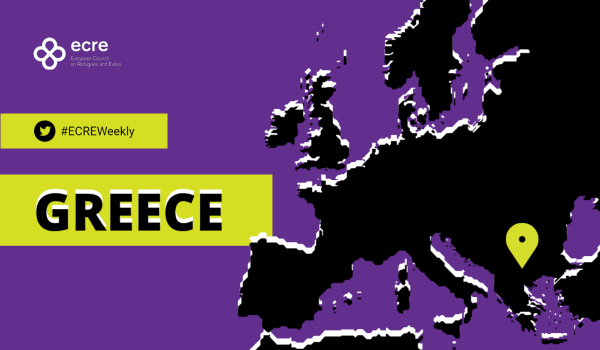The EU funded Emergency Support to Integration and Accommodation programme (ESTIA) continues to unravel. Trial on Syros, arrests in Thessaloniki and pushbacks in Evros illustrates how Greece ‘welcomes’ people in need of protection.
After the Greek Government took over the management of the ESTIA accommodation programme at the end of 2020 from the UN Refugee Agency (UNHCR) it quickly began to unravel. Now, local media reports how apartment owners, employees, organisations and municipal companies across Greece involved in the implementation of the ESTIA project, are falling into despair. Months of delays in the payments for the scheme, that has seen the number of accommodation places reduced and is set to be determined by the end of 2022, is leaving behind unpaid rent, costs and suppliers. However, with one significant exception – the deeply controversial ‘NGO’ Hopeten (formerly Hopeland) that appeared out of nowhere with no prior involvement in refugee assistance in 2020 after the government had introduced strict registration requirements on other NGOs. The organisation that has been accused of corruption and money laundering, according to a research by Solomon is the only of at least 20 implementing partners that has received its payments.
Border-line Europe reports on the trial of the three Syrian survivors Abdallah J, Kheiraldin A, and Mohamad B facing 18 life sentences at their trial on 5 May on Syros. Unable to pay their way to safety, on 24 December 2021 the three men accepted to steer an overcrowded boat carrying 80 people to Italy from Turkey in return for a reduced cost to human smugglers for the crossing. The boat capsized off the Greek island of Paros and 18 people lost their lives. Commenting on the ruling sentencing the three survivors to a combined 439 years of imprisonment Border-line Europe stated: “Even though the court acknowledged that they are not smugglers that acted for profit, dropped the charges of “being part of a criminal organization” and did not impose life sentences, the three fathers were still convicted for “facilitating unauthorized entry”. Journalist for Der Spiegel, Giorgos Christides stated: “Dystopian fiction couldn’t make this stuff up – five centuries worth of prison sentences handed out to three asylum seekers for “facilitating unauthorized entry”. According to Border-line Europe: ”the filing of such charges against migrants arriving on the Greek islands has been systematically used by the Greek state for several years. The arrests that follow these often-unfounded accusations of smuggling are arbitrary, and the trials flout basic standards of fairness. Without sufficient evidence, they are usually arrested upon arrival and kept in pre-trial detention for months”. Further, the organisation notes that: When their case finally comes to court, their trials average only 38 minutes in length, leading to an average sentence of 44 years and fines over 370.000 Euro”.
At least three beneficiaries of member organisations of Border Violence Monitoring Network (BVMN) were arrested on 29 April in Thessaloniki, where Greek police has launched operations according to the network targeting “improvised homeless shelters and a food distribution site for vulnerable people with serious protection needs”. BVMN further warns: “We have collated a body of evidence that suggests detention and illegal pushbacks are often a subsequent outcome of police operations, which entail numerous violations of international human rights provisions such as access to asylum, non-refoulement, and the prohibition on collective expulsions”.
ECRE member, Greek Council for Refugees (GCR) reported on 30 April that the European Court of Human Rights (ECtHR) granted interim measures: “for 5th group of Syrian refugees stranded on an islet in the Evros river” – pushbacks, some with deadly result, by Greek authorities have been widely reported in the Evros region. According to GCR: “Over the past three weeks, the Greek Council for Refugees (GCR) has represented the Syrian refugees, including 44 children, before the ECtHR, by filing 5 applications for interim measures (R 39), requesting for the Syrian refugees to be granted humanitarian assistance and access to the asylum procedure”. A recently published months-long investigation by DER SPIEGEL, Lighthouse Reports, Swiss media outlets SRF and Republik and the French newspaper Le Monde revealed that the European Border and Coast Guard Agency (Frontex) recently seeing its Director resign: “was involved in the illegal pushbacks of at least 957 refugees between March 2020 and September 2021. In 22 of these cases, the availability of open source intelligence like photos of the refugees in Greek life rafts, make it possible to define them as pushbacks without any doubt. The true number of pushbacks conducted with Frontex assistance is likely even higher”. MEPs have voted against the approval of the agency’s 2020 budget reportedly partly over its failure to investigate alleged human rights violations of asylum seekers in Greece.
Greece is reportedly hiring 250 border guards to “deal” with refugees after just three months of training. However, with Greek authorities preventing the monitoring of areas of operation of the Hellenic Coast Guard and the country ranking the lowest in the EU for press freedom, according to the annual World Press Freedom Index there is limited risk of exposure should the training prove to be insufficient.
For further information:
- ECRE, Greece: Solidarity With Ukrainians Have Sparked No Change for Other People in Need of Protection, Chronic Barriers for Refugees, Commission Expects Government to Ensure the Health and Safety in High Risk Lesvos Camp, April 2022
- ECRE, Greece: Guarantees of Capacity for Ukrainian Refugees while the Situation Remains Dire in Camps Across the Country, Government Body Finds No Evidence of Pushbacks, April 2022
This article appeared in the ECRE Weekly Bulletin. You can subscribe to the Weekly Bulletin here.

